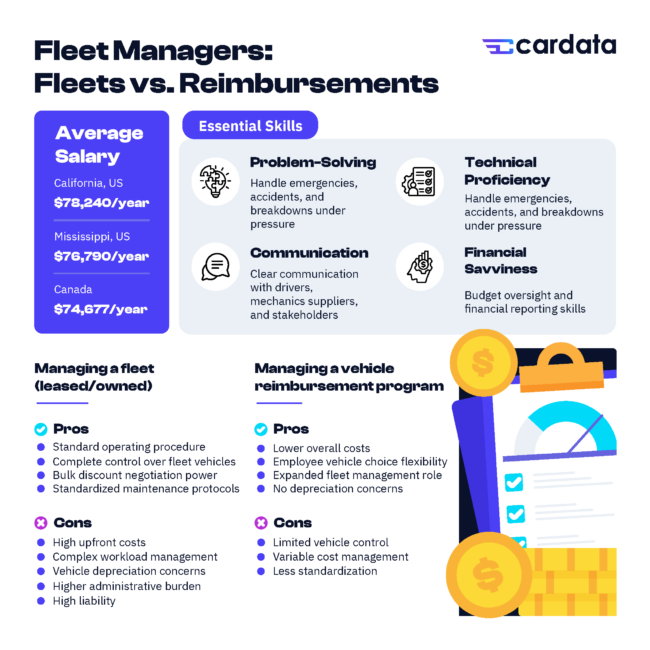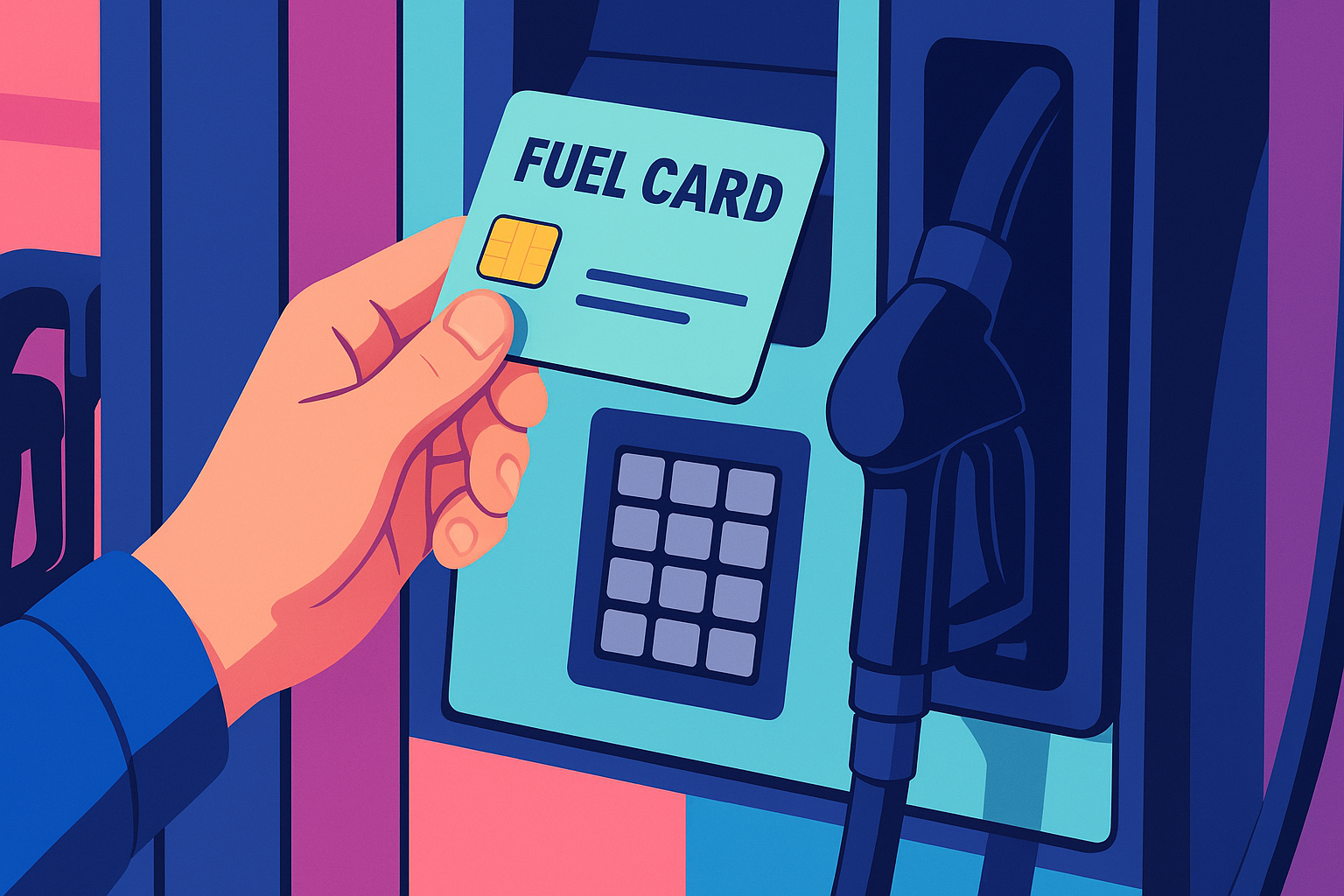Speak to an Expert
Book a CallIntroduction
What does a fleet manager do? The answer is contingent on several factors, including fleet size, type, and the location of the company making use of the cars. Managing a fleet of vehicles comes with varying degrees of stress. Given the variety of fleets available, there is no single template for understanding the role of transportation managers. This article outlines some of the perks and drawbacks of the job, as well as the specific ways fleet management can be understood, such as the credentials needed to take on the job, potential salaries, and general responsibilities.
Exceptional fleet maintenance is not just a matter of having someone tend to company vehicles. Fleet manager responsibilities, as varied as they may be, need to be treated as the lifeblood of a company. If your line of work depends on transportation, the safety, efficiency, and regulatory compliance of fleet vehicles can make or break the business.
Fleet vehicles have some advantages over personal vehicles and reimbursement programs, like lower maintenance costs, tax benefits, and bulk discounts. Despite these perks, it can be difficult to manage things like fuel consumption, driver safety, and environmental impact. Given how large vehicle fleets can be, the amount of preventative maintenance required is potentially overwhelming. That’s why most companies outsource this job to specialty fleet managers, though some companies may opt for in-house fleet manager roles.

What is the role of a fleet manager in fleet management?
Fleet managers are responsible for the integration of a fleet. That is to say, if a company doesn’t already have cars at its disposal, the person overseeing transportation methods will take on duties like hiring, training, and supervising the staff involved in the fleet operation such as drivers, mechanics, dispatchers, or administrators.1 Once the process of fleet procurement is complete, the tasks fleet managers must take on commonly pertain to vehicular efficiency and keeping track of vital metrics.
They are also expected to complete an array of administrative tasks that help cars remain functional while on the road; these duties are akin to those of a human resources rep, like managing driver training and licensing, coordinating driver schedules and finding efficient routes, negotiating contracts with vendors and suppliers, developing and implementing policies, and reporting on fleet costs and performance.
1 Fleet Manager job description template | Workable
What are the skills of a fleet manager?
Company fleets can consist of any type of car, from everyday sedans and trucks to courier vans and full-on buses – the kind that comprises public transportation systems around the globe. Accordingly, some skills are more relevant than others, depending on the type of fleet and its unique needs. However, these soft and hard skills, broadly speaking, are integral for effectively managing just about any class of vehicle fleet:
- Problem-Solving: Fleet managers must be able to handle the pressure of everyday emergencies, accidents, or breakdowns that may throw a wrench in fleet services. Vehicles frequently traveling long distances specializing in things like couriering, construction, or public services are more accident-prone and require fleet managers to maintain their cool while under pressure.
- Communication: A fleet manager needs to communicate clearly with drivers, mechanics, suppliers, customers, and other stakeholders. This also necessitates active listening, giving constructive feedback, negotiating contracts, resolving conflicts, and presenting reports with relative ease.
- Leadership: A fleet manager needs to motivate, inspire, delegate, coach, and evaluate their team members. A fleet manager should also be able to set goals, monitor performance, enforce policies, and ensure compliance.
- Technical Proficiency: A fleet manager should be able to use various management system software tools and systems to track, analyze and optimize the fleet’s performance, efficiency, and safety. Without technical prowess, a fleet manager will be unable to maintain operational efficiency.
- Financial Savviness: Properly keeping tabs on the many flows of capital surrounding fleet vehicles requires honing one’s organizational skills to oversee budgets to profitability and returns on investments. Fleet managers need to calculate expenditures, revenues, savings, and losses, as well as prepare and review financial reports and statements.
What is the job description of fleet management?
Procurement is the process of deciding whether to lease or buy vehicles based on the needs and budget of the organization is a major aspect of the role, as is assisting in the recruitment of quality drivers into the fleet and providing them with training and support. A fleet manager job description may also include the following tasks:
- Monitoring and tracking the real-time performance and location of motor vehicles and drivers using GPS or other systems – this is not unlike supply chain management for vehicle fleets.
- Analyzing data and preparing reports on vehicle costs, mileage, fuel efficiency, driver behavior, and other metrics about telematics.
- Ensuring compliance with local, state, and federal regulations and laws regarding vehicle operation, licensing, registration, and environmental issues.
- Negotiating contracts and deals with vendors, suppliers, and service providers for vehicle purchase, lease, maintenance, repair, and fuel.
- Keeping up to date with the latest trends and technologies in fleet management.
Is being a fleet manager a stressful job?
Job seekers can rejoice, because the short answer is: no, fleet management is not a particularly stressful industry. While an efficient fleet operation needs to be thought of as a position on par with a company’s operations manager, it is not necessarily a difficult job to take on, mostly because there are so many tools available to make fleets run smoothly. Used correctly, these tools can mitigate the stress of even the heaviest of workloads. However, like any job, it can become complicated if the right precautions aren’t taken to stay on top of an ever-growing workload.
How to become a fleet manager
Becoming a fleet manager can be a wonderful path for those who enjoy high-stakes decision-making and possess the interpersonal skills needed to successfully oversee both people and machines. No doubt, it is a rewarding career; a successful fleet can greatly contribute to the growth and prosperity of an organization. Given the caliber of the position, however, there are quite a few competencies needed to successfully earn one’s place in the world of fleet management.
At the very least, potential fleet managers need to possess a high school diploma or equivalent, as well as some experience in the transportation industry. However, most employers opt for candidates with bachelor’s degrees or diplomas in business administration, logistics, engineering, or other related fields. Additionally, some businesses require an associate degree from a professional organization such as the Canadian Association of Fleet Supervisors (CAFS) or the Automotive Fleet Management Association (AFMA). Successful fleet managers require a lot of work experience in managing vehicles and drivers with valid commercial driver’s licenses, as well as knowledge of vehicle mechanics, and adeptness in fleet management software. A certified automotive fleet manager (CAFM) credential may also help sway potential employers.
How much does a fleet manager earn?
On average, fleet managers in Canada make approximately $74,677 per year as of April 17, 2023.2 They might make more in the United States (see example below). This varies according to factors like location, experience, education, and certification. For example, a fleet manager in a more demanding and fast-paced work environment – for instance, one working to manage public transportation companies in a major city like Toronto – is likely to earn more than a fleet manager in a smaller town with fewer opportunities to oversee large fleets. Let’s take two disparate examples here: Mississippi and California. Fleet manager salaries in the US:
- Mississippi: According to the U.S. Bureau of Labor Statistics, the median annual wage for transportation, storage, and distribution managers, which includes fleet managers, was $98,230 in May 2020. In Mississippi, the average salary was $76,790 as of April 2021. This is lower than the national average of $81,346, but still higher than some neighboring states like Alabama ($74,972). The highest-paying city for fleet managers in Mississippi was Jackson, with an average salary of $82,713.3
- California: The average salary for a fleet manager in California is $78,240 per year as of April 2021. Some fleet managers can earn as little as $35,000 or as much as $104,0004 per year. Indeed, the financial incentives of these jobs are highly dependent on geographical location.
2 Fleet manager salary in Canada
4 Fleet manager salary in California
Fleets vs. vehicle reimbursement programs
Fleets are the most expensive of all business vehicle programs because the company has to pay for maintenance, insurance, depreciation, fuel, and taxes. Additionally, a fleet of company cars may not be tax-efficient, as the IRS considers personal use of company cars as a taxable fringe benefit. However, fleet programs usually offer a greater degree of control over the fleet and the associated expenses. Companies that require their employees to travel frequently may find it beneficial to have a fleet program in place.
A Fixed and Variable Rate (FAVR) program reimburses employees for using their cars for work; the reimbursement is based on both fixed costs (such as insurance and registration) and variable costs (such as gas and maintenance). These programs are more flexible and cost-effective than a fleet of company cars because the company only pays for the business use of the vehicles, not the personal use. A FAVR reimbursement program is also more tax-friendly, as the reimbursements are not considered income by the IRS.
Fleet manager vs. vehicle reimbursement program manager
- Pros of Fleet Managers:
- Expertise: Fleet managers are certified experts and very trustworthy in their immense knowledge of the trade.
- Control: Owning and managing their fleet means companies have complete control over the vehicles they use.
- Savings: Fleet managers can negotiate discounts on vehicle purchases, fuel, and maintenance, which can result in significant cost savings for the company. Despite this unofficial perk, they are still quite costly.
- Cons of Fleet Managers:
- Upfront Costs: Starting a fleet from scratch can be expensive. The company will need to purchase or lease vehicles, hire drivers, and invest in maintenance and repair services.
- Workload: Managing a fleet can be time-consuming and complex. Fleet managers must keep track of numerous details, such as driver logs, vehicle maintenance schedules, vehicular downtime, and fuel consumption.
- Depreciation: Vehicles depreciate over time, and companies that own their fleet must account for this in their budgeting.
- Pros of Vehicle Reimbursement Program Managers:
- Savings: Vehicle reimbursement programs can be less expensive than owning and managing a fleet, especially for small companies or those with a limited budget.
- Flexibility: Employees can choose the vehicles they want to use, which can be a valuable perk for recruitment and retention.
- Workload: Vehicle reimbursement programs require less administrative work than fleet management, as the company only needs to track and reimburse employees for their mileage.
- Cons of Vehicle Reimbursement Program Managers:
- Control: With a reimbursement program, the company has less control over the vehicles employees use and may not be able to ensure that they meet their specific needs and standards.
- Liability: If an employee is involved in an accident while driving their vehicle for work purposes, the company may be liable for damages.
- Costs: Reimbursement programs can be more difficult to manage and budget for, as costs can vary depending on factors such as fuel prices and employee driving habits. Vehicle reimbursement programs can be less expensive and more flexible, but lack control and may be more difficult to manage and budget for.
Conclusion
Ultimately, FAVR may be a more fruitful way to manage company vehicles and, in the long term, may come to replace fleet management entirely. But, as it stands, fleet managers play a vital role in the operations of many successful companies across the globe. To be successful, fleet managers need to possess problem-solving, communication, leadership, technical, and financial skills. While it is not a particularly stressful industry, fleet management requires a great deal of attention to detail and responsibility. It can be a rewarding career choice for those hungry to take on a lot of responsibility.
Disclaimer: nothing contained in this blog post is legal, accounting, or insurance advice. Consult your lawyer, accountant, or insurance agent, and do not rely on the information contained herein for any business, personal financial, or legal decision-making. While we strive to be as reliable as possible, we are neither lawyers nor accountants, or insurance agents. For several citations of IRS publications, on which we base our blog content ideas, please always consult this article: https://www.cardata.co/blog/irs-rules-for-mileage-reimbursements. For Cardata’s terms of service, go here: https://www.cardata.co/terms.
Share on:



